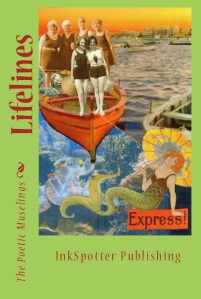When we Poetic Muselings first approached the idea of putting together a poetry collection, our initial theme was that of the muses. It didn’t work out, and you can read about that journey here. However, I still think the Muses is a good topic.
The origin of the muse goes back to the nine muses of Greece. There are four different versions of their parentage, so I won’t delve into that. It is said that all tales and songs, all inspired knowledge, come from the Muses. Each has their own specialty and associated emblem. These are the most common names and attributes:
Calliope, muse of epic song, carries a wax tablet. Clio, muse of history, carries a scroll. Euterpe, muse of lyric song, plays a double flute. Thalia, muse of comedy and bucolic (characteristic of the countryside or pastors) poetry, is seen wearing a comic mask and ivy wreath, holding a shepherd’s staff. Melpomene, muse of tragedy, wears a tragic mask and ivy wreath. Terpsichore, muse of dance, is seen dancing while playing a lyre. Erato, muse of erotic poetry, plays a maller lyre. Polyhymnia, muse of sacred song, is depicted veiled and pensive. Urania, muse of astronomy, is pictured with a celestial globe.

The nine canonical Muses. From left to right: Clio, Thalia, Erato, Euterpe, Polyhymnia, Calliope, Terpsichore, Urania, and Melpomene. Drawing of a sarcophagus at the Louvre Museum. (Photo credit: Wikipedia)
Mousa, in addition to being the greek word for “muse”, literally means “song” or “poem”.
In modern day, the word muse has a much broader meaning. It no longer refers to the original nine. Much more personalized, everyone can have their own muse, the source for his/her inspiration.
The muse comes in different forms. For some, it is a creature – perhaps a fairy or a dragon. For others, it is something specific in their life that inspires them – nature, walking, music. Perhaps it is an actual person – a friend, sibling, or spouse that you speak to and come away re-enthused and inspired.
My muse is more likely to show up if I play Celtic music. It can come in the form of a woman, or a dragon, or merely magic in the air that blocks out the rest of the world.
Stephen King has a muse, which he writes about in his book “On Writing: A Memoir of the Craft.”
There is a muse, but he’s not going to come fluttering down into your writing room and scatter creative fairy-dust all over your typewriter or computer station. He lives in the ground. He’s a basement guy. You have to descend to his level, and once you get down there you have to furnish an apartment for him to live in. You have to do all the grunt labor, in other words, while the muse sits and smokes cigars and admires his bowling trophies and pretends to ignore you. Do you think this is fair? I think it’s fair. He may not be much too look at, that muse-guy, and he may not be much of a conversationalist (what I get out of mine is mostly surly grunts, unless he’s on duty), but he’s got the inspiration. It’s right that you should do all the work and burn all the midnight oil, because the guy with the cigar and little wings has got a bag of magic. There’s stuff in there that can change your life.
Later he writes about the importance of having a regular writing schedule, and how it is for the muse as much as for yourself.
Don’t wait for the muse. As I’ve said, he’s a hard-headed guy who’s not susceptible to a lot of creative fluttering. … Your job is to make sure the muse knows where you’re going to be every day from nine ’til noon or seven ’til three. If he does, I assure you that sooner or later he’ll start showing up, chomping at his cigar and making his magic.
If you’re always waiting for inspiration to write, you won’t get much done. Is it not better to exercise your writing muscles while you wait for your muse to come to you? Even if all you do is stare at a blank screen, you are opening yourself for it to come.
What form does your muse take?
(Bulk of article was originally written for a Writing.com Fantasy Newsletter in 2008)


Comments on: "Forms of the Muse" (6)
Great post Mary. Maybe we should dig out the poems we wrote for our Muses.
Thanks, Lin. I agree! We should pull those out sometime.
Mary, I love the Stephen King post — great image for personified inspiration –
[…] Forms of the Muse (poetic-muselings.net) Share this:TwitterFacebookMorePrintEmailLike this:LikeBe the first to like this post. […]
[…] Forms of the Muse (poetic-muselings.net) […]
[…] Forms of the Muse (poetic-muselings.net) […]